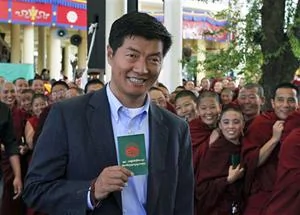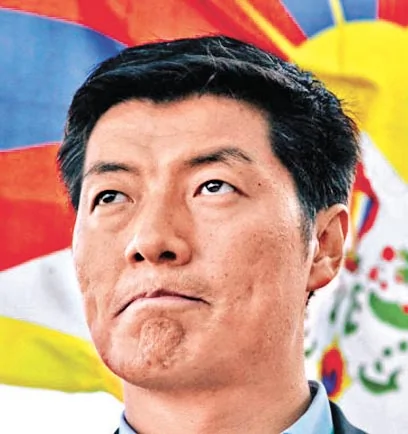哈佛學者當選流西藏流亡政府總理 中共難堪
參與這次選舉的流亡藏人來自印度,美國,加拿大,歐洲,澳洲,台灣等13個國家和地區,投票人數有五萬左右。由於中共施壓,尼泊爾和不丹的兩萬多名藏人沒能參加投票。
西藏流亡政府駐台灣代表、達賴喇嘛西藏宗教基金會董事長達瓦才仁表示,這次選舉標誌著西藏政教合一制度的結束,和民主制度的確立。
達瓦才仁:「而且最主要的是,結束了從1642年開始由五世達賴喇嘛建立的政教合一的制度,已經完全被結束了。不管從制度層面,從理論層面,或者從各個層面他都是完全走向民主化。也就是說,西藏民主從此走上沒有回頭路的民主之路了。」
洛桑森格現年43歲,出生於印度,畢業於德里大學,曾擔任西藏青年大會領導人。1995年洛桑森格赴美國留學,獲哈佛大學法學博士,畢業後擔任哈佛大學法學院研究員。
流亡政府發言人土登桑波對《美國之音》表示,洛桑森格內閣面臨的最大挑戰是如何繼續與中共政府對話,解決西藏長期以來的問題。
但是達瓦才仁認為,由於中共一直都沒有和談的誠意,所以流亡藏人內部任何的改變,都解決不了藏中之間的問題。而且中共當局對於達賴喇嘛不再擔任政治領袖的局面相當惱火,因為這令中共希望通過扶持宗教領袖,從而控制西藏局勢的手段難以實施。
達瓦才仁:「不管是今天的局面或者任何的局面,中共政府都會去攻擊,都會說這是欺騙。當然中共政府肯定會感到難堪。因為他說不存在西藏問題,只有達賴喇嘛問題,那達賴喇嘛已經不是西藏政府的領袖,但是西藏問題的存在,他就不得不,必須要正面面對西藏的問題。而且很多以前可以用比較隱晦的方式,或者是宗教或者那些方式去解釋的,現在他就不得不去直接面對。」
而對於國內的藏民,政教分離的新局面對他們來說,是一個鼓舞,令他們對未來的前景看得比較清晰。
達瓦才仁:「境內的西藏人民他們也希望西藏未來,或者說如果有一天達賴喇嘛不在,會有什麼樣的狀況。會向什麼樣的發展。西藏境內那些考慮西藏民主未來的很多人,都希望有一個比較明確的未來的前景。那麼這次通過民主選舉以及達賴喇嘛退休,他其實就給人們已經提供了這樣一個前景。」
洛桑桑格曾表示,他完全支持達賴喇嘛奉行的中間路線,就是謀求西藏在中國統治下獲得有意義的自治,而不是獨立。美國西東大學退休教授楊力宇對《自由亞洲電台》表示,洛桑桑格在可以預見的未來不會偏離達賴喇嘛的中間道路。但是從長遠來看也存在變數。因為他屬於年輕一代,這一代人很多主張獨立。
中共當局日前抓捕了阿垻縣格爾登寺的三百名僧人,並打死兩名村民。印度達蘭薩拉流亡藏人,正在全力抗議中共當局的新一輪血腥鎮壓。
新唐人記者秦雪、周平採訪報導。
Tibetan Exiles' New Leader
The Tibetan Government in Exile announced
on April 27 that Dr. Lobsang Sangay, a Harvard
Law School research fellow, was elected as
Prime Minister of the exiled Tibetans.
This marks the end of Tibet's 300 years of theocracy.
Experts said that the new situation would be encouraging
to the Tibetans in China, but embarrassing to the CCP.
The voters-in-exile were from 13 countries, including
India, U.S.A., Canada, and Australia. The number of
voters was about 50,000. Due to the pressure from
the Chinese authorities (CCP), over 20,000 Tibetans
in Nepal and Bhutan were barred from voting.
Rep of Tibetan government in Taiwan, Dawa Tsering
said, the election marked the end of Tibet's theocracy
and the establishment of a democracy.
Dawa Tsering: It marks the end of Tibetan theocracy,
which was established in 1642 by the 5th Dalai Lama.
From an institutional perspective or on the theoretical
level, the political system is being democratized.
Tibet is on the road of no return towards democracy.
Lobsang Sangay, 43, was born in India and graduated
from the Univ. of Delhi. He served as leader of Tibetan
Youth Congress. In 1995, he went to the U.S. and later
received his DJS from Harvard Univ. After graduation,
he worked as a research fellow at Harvard Law School.
Spokesman Thupten Samphel for Tibetan authorities
told VOA, Lobsang Sangay's biggest challenge is how
to continue dialogue with the CCP for Tibetan issues.
Dawa Tsering believes the CCP lacks sincerity in
peace talks. Changes within the Tibetans in exile
cannot solve the Sino-Tibetan problems.
The CCP is very angry at the new situation, because
it can no longer control Tibet through supporting
religious leaders, as Dalai Lama has already quit.
Dawa Tsering: Regardless the situation,
the CCP government will attack it and call it cheating.
Of course, the CCP would certainly be embarrassed,
as it said that there was no Tibetan issue,
but only the issue with the Dalai Lama.
Since Dalai Lama is no longer the government leader,
the CCP will be forced to face the existing Tibetan issue.
In the past, it could use obscure or religious means.
Now it has to face the issue directly.
To the Tibetans in China, the situation of secularism
is an encouraging prospect for their future.
Dawa Tsering: The Tibetans inside Tibet also want a
future for Tibet. They want to know if the Dalai Lama
is no longer around one day, what kind of situation
and development will take place.
Many Tibetans inside China who hope for a democratic
future Tibet want to have clearer prospects.
This democratic election and Dalai Lama's retirement
actually give such a prospect to the Tibetan people.
Lobsang Sangay has said that he fully supported
Dalai Lama's pursuit of the road.
It is to seek Tibet's autonomy under the Chinese rule,
instead of independence.
Retired professor Yang Liyu of Seton Hall University
told Radio Free Asia that in the foreseeable future,
Lobsang Sangay wouldn't deviate from the road.
However, there can be changes in the long run.
He belongs to the younger generation.
Many of this generation advocate independence.
The CCP authorities recently arrested 300 monks
in Kirti Temple in Aba County and killed two villagers.
Tibetan exiles in Dharmsala, India, are protesting
the CCP's new round of bloody crackdown.
NTD reporters Qin Xue and Zhou Ping
責任編輯: zhongkang 轉載請註明作者、出處並保持完整。
本文網址:https://tw.aboluowang.com/2011/0430/203593.html
相關新聞


 紅二代:彭麗媛和江青沒法比 為這看上習近平
紅二代:彭麗媛和江青沒法比 為這看上習近平




 中共官媒使用被禁止的西藏流亡政府國歌
中共官媒使用被禁止的西藏流亡政府國歌 西藏流亡政府總理洛桑森格:不挑戰中共統治 圖
西藏流亡政府總理洛桑森格:不挑戰中共統治 圖 美議員關注自由亞洲電台是否被操控
美議員關注自由亞洲電台是否被操控 藏人當選的噶倫赤巴洛桑僧格博士在就職演說全文
藏人當選的噶倫赤巴洛桑僧格博士在就職演說全文 洛桑桑蓋「藏人的歐巴馬」中供的難題
洛桑桑蓋「藏人的歐巴馬」中供的難題 西藏流亡政府總理浮出水面 哈佛博士大熱
西藏流亡政府總理浮出水面 哈佛博士大熱 西藏流亡政府回應溫家寶講話
西藏流亡政府回應溫家寶講話






